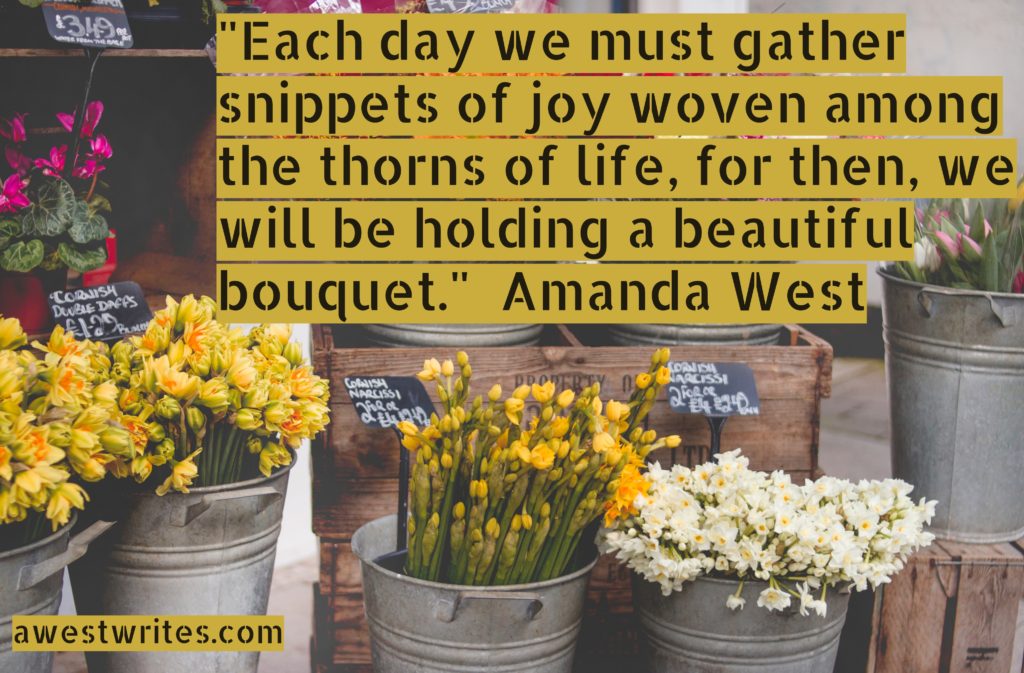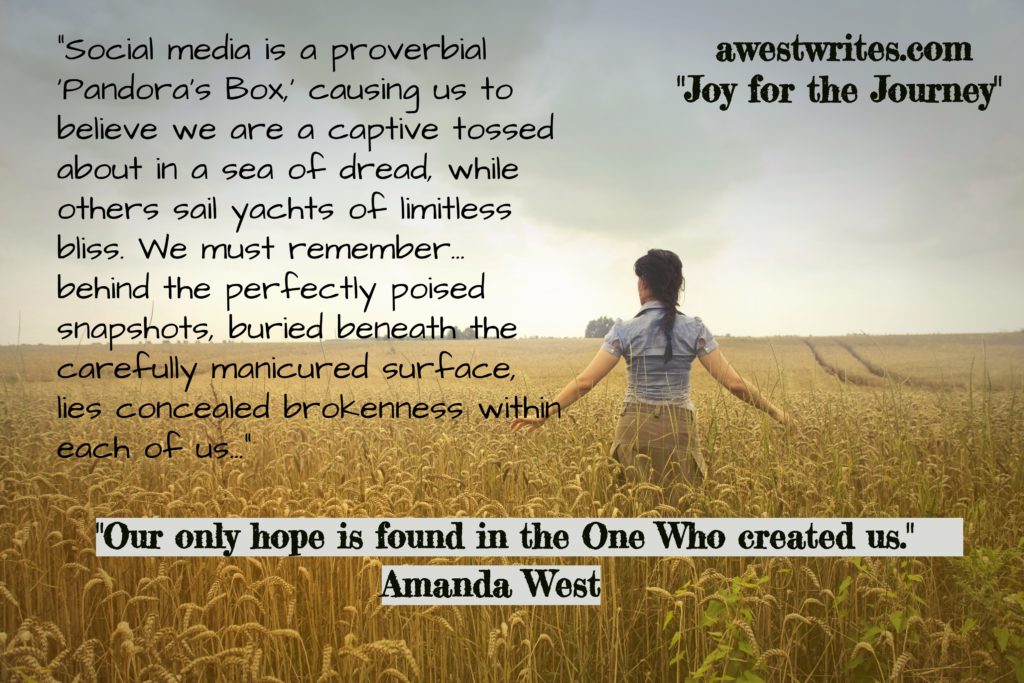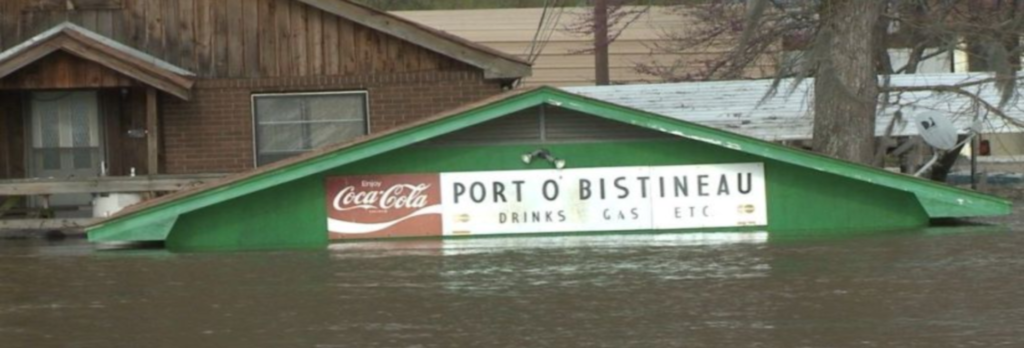The dark, murky waters of Lake Bistineau lapped against the small boat. The trolling motor penetrated the stillness as it gently sliced its way through the raging flood waters. A chill ran through me, but it wasn’t the late March air causing the sudden wave of panic. I gasped when I looked over the side of the boat. A foot beneath us lay the top of a chain link fence still secure in the ground, beside a silver mailbox with the name of the owner scrawled across the side. Waves created by the small motor pushed floating debris towards dry land while simultaneously pushing it back into the water creating a thin edge of bags, milk cartons, and other items washed out of their rightful places.
It came with warnings, and yet for the people living in the houses along its borders, they had no choice but to wait. They watched as the waters seeped under their foundations rising higher with every passing minute. They held their breath and prayed something supernatural would happen and the waters would somehow miraculously recede. Tears streamed down the faces of some who had lost this battle before and knew the strength it would take to overcome it once again. I remember one brave man who said, “I fought in Vietnam, I’m not leaving. If I can live through that, I can surely make it through this.”
By the time the heavy rains stopped days later, and the waters flowing from upstream had met with the already swelling banks, most of their homes would be lost underneath. Their belongings would be left covered in mud, stagnant water, and eventually, mold. My mind played the scenes over and over, a nagging guilt enveloping me as I returned to my home sitting dry and untouched on higher ground.
“What can we do?” I wondered.
“These are our neighbors; we’ve got to find some way to help them,” I told my husband. I began pulling everything I could out of my deep freeze and prayed I could somehow make the little I had stretch. As I stirred the ham and bean soup simmering on the stove, I asked myself repeatedly, “How can I feed so many, with so little. Can I even make a difference?”
We returned to the flooded street with the water almost above the road sign, and tried to focus on the ones who were waiting beyond, and not on the waters that had risen higher in just the few short hours since our last visit. Lord, please let this hot soup be enough to feed all of these hurting people, I silently prayed. I knew this small gesture could never erase the brokenness awaiting us at each threshold, but I held my breath and hoped it would offer comfort.
We stepped over into the unsteady boat, and silently inched our way out into the open waters trying to watch below for swing sets, submerged cars, and the hidden roofs of the homes that were now too far gone to be saved. Our first stop would be the Vietnam veteran who had refused to leave. Water was now completely covering his yard and filling his crawl space. His front porch stoop had disappeared beneath the brown water, but when we called, he emerged from somewhere inside and opened the metal storm door, greeting us with a wide smile at the sight of the hot soup and bread. As we continued to each home passing out bowls and offering a prayer, I was taken aback by the eerie quiet that hung about us like the moss in the towering cedar trees above.
As the sun began to fade in the sky, we could see porch lights flickering underneath the waters, illuminating the location of a home buried underneath.
“You see that house?” our boat captain asked. “The owner refused to leave. They had to pick her up and put her in the boat to get her out.” I shook my head in partial understanding, as he continued. “She’s up in her eighties; she and her husband both, and they didn’t want to leave their keepsakes behind. He built her a room off the back lined with shelves just for her antiques.” He lowered his head, his shoulders hunched, “It’s all under water now. Ruined. She stayed inside as long as she could. Until the waters were coming up over her counter tops and filling her kitchen sink.” I stared in disbelief at the completely submerged home and knew her treasured antiques were somewhere deep inside.
As the boat traveled further down the watery street, we saw more homes. Most were abandoned, but some still showed signs of life inside. A few of the houses still above floodwaters held owners who now sat quietly on their porches looking out over the still rising water with hollow, distant eyes. They would wave as if we were just out for a Sunday afternoon ride.
We would call out, “Hot soup. Bottled water. Do you need anything?” A smile would rise to their lips as they would walk precariously towards us on their half-submerged porches, abandoned cars or whatever they could find. One man whose home sat slightly higher than the floodwaters ran to meet our boat. He stretched his long arm out, delight filling his eyes as he took his small bowl of soup, but as he walked back towards his home, he slipped and sunk beneath the water up to his chest. He held his hands up high. “Don’t worry! I saved the soup!” I couldn’t help but smile, God had answered my prayer, the soup had been “enough.”
Towards the end of the road, we came to the home of one of the original settlers of the camp. Now up in her eighties, her already dilapidated home sat just past the flood waters. After several minutes of hard knocking, she opened the door, a toothless grin covering her face. “Oh, thank you, Jesus,” she prayed out loud. “I was just asking God to send me a friendly face, and a hot meal. You know my family settled in this camp when I was just a little girl. I’ve seen a lot of floods in my day, but none such as this. My daddy used to pull some of the biggest fish you ever did see out of that there lake.” She looked down her drive at the water-logged shells of three classic cars belonging to her late husband, blinking away a tear “No sir, I’ve never seen it this bad before.”
After bidding her farewell we walked back towards the awaiting boat. I called over my shoulder as she stood waving, “We’ll be back tomorrow with more soup!” “This is a fine thing y’all doing,” she called out as the boat pulled away, “Yes sir, a fine thing.”
Sometime later, as my husband and I headed back towards our truck anxious to get home to our four children I thought of each brave face we had seen. I couldn’t help but dwell on their stories, the ones who left, and the ones who chose to stay. I had hoped to be a blessing to my neighbors by filling their bellies and offering comfort, but what I realized was they had doubly blessed me instead. They had given me a chance to witness raw beauty; the true human spirit, full of strength mixed with gumption. I had witnessed people living out their worst nightmares, yet each one held a smile, kind words, and a steadfastness that whispered to my spirit that “if they can make it through this, I can surely make it through anything life hurls at me.”’
Each day we returned with more hot soup and bread. Word spread about our little “soup mission” and a local dollar store donated bowls, another donated rice, and others donated hygiene supplies. Before long, our church fellowship hall was stacked to the ceiling with flood buckets, Salvation Army food boxes, clothes, canned goods, and toilet paper. Our state senators and local government officials donated an 18-wheeler sized load of tarps, wheelbarrows, and shovels. The Lord had now turned a little pot of soup shared among strangers into a relief center meant to help the families of our entire parish who were affected by the flood. It was as if God had once again taken the “five loaves and two fish” and passed the little around, and given us twelve baskets left over, but this time the increase wasn’t just food.
As we prayed for ways to continue to help our neighbors, the phone would ring and a stranger’s voice would say, “I heard about your situation. I’m on my way with a trailer full of supplies, clothes and all the fixens we need to make a pot of gumbo.”
Day after day, the calls came. We opened up our church fellowship hall like a store, only you didn’t need money, but the strangest thing happened; the shelves were still full after a week. I knew the Lord was providing, and the calls were still pouring in for donations, but it was more than that. I watched as cars pulled into the parking lot and left with one or two items. I listened as one after the other said, “Can I just have some water, and maybe a toothbrush,” before they would add, “If there’s enough for everyone.”
I couldn’t believe what I was hearing, “If there was enough for – everyone!” I couldn’t help but think, Of course, there’s enough for everyone, look at this place, it’s packed to the ceiling with supplies! I didn’t understand. These were people who had lost every single thing they owned. And, yet they were thinking of their neighbors’ needs above their own. I had seen their homes underwater, devastated, yet they were concerned about not taking “too much” because they wanted to make sure there was plenty for everyone else affected.
I had never before witnessed such love and thoughtfulness for one’s fellow man, for neighbors they had never met, until I heard those words repeated over and over from each visitor seeking supplies. I had always been taught to “treat others the way I wanted to be treated,” but I had never seen that lived so boldly as I was seeing it now. The days passed, and still the shelves and tables were full of supplies. We begged visitors to “take what they needed,” and they did, always taking “just enough,” and leaving plenty for someone who “might need it more than them.”
With relief supplies still arriving and with room to store them growing scarce, we began loading up our truck and driving out to the locations where we knew the floodwaters had begun receding. We knocked on doors of complete strangers and delivered boxes full of cleaning supplies, trash bags, and tarps.
A neighbor told us the story of an elderly man who as the flood waters were filling his yard and home got an old metal chair and placed it in the corner of his yard. As the water rose around his ankles, and up to his legs, he refused to leave the spot he had chosen as his grave. His son begged him, “Dad, you must leave! The water is rising!” The man hung his head, and replied, “Last week, I buried my wife. Now, I have nothing left. I’m going to sit right here until I join her.”
As we parked our truck in front of his home, that scene from weeks earlier played through my mind. The son had succeeded in making his father leave, but now they had returned to find a lifetime of possessions covered in sludge and the faint signs of black mold beginning to take over. “Sir, we have relief supplies,” my husband called.
The old man’s face clouded with tears, “But, why? Why would you do this for me? You don’t even know me.” The man followed us to the truck and peered in, “I could use a tarp, and that mop. How much do I owe you?”
My husband smiled and said, “These things were donated to you, they’re free. God commanded us to love our neighbors as ourselves, and in doing so, we should help those who’ve fallen on hard times. I’m just trying to care for you as I would care for myself.”
It took some reassurance, and a little bit of begging, but he finally accepted the much-needed supplies. I could tell this small gesture touched him deeply, but I also knew it was hard for him to accept something from someone else. I quickly learned this gentleman wasn’t the only one with this attitude, these muddy streets would be lined with neighbors who believed in working for what you received and not accepting hand-outs from “outsiders.”
As we went door to door, and street by street, we encountered many stories told by the survivors of happier times. They described homes and cars and years of hard work now washed away or desecrated by the flood waters. Many shared memories of the last time a flood ravaged their homes, and how they rebuilt higher and further away from their original foundations, and yet somehow the waters found them a second time.
As the months passed, friendships were formed, and many visits were made to check on our newfound friends. God had taken a terrible situation, and used it to teach our community about loving one another, rebuilding together and that it was okay to accept the help of others. I had seen first-hand God use a few cups of hot soup and turn it into a parish-wide relief effort. Out of the ruins had risen a spirit of togetherness and comradery unlike any I had ever witnessed.
When Christmas came around, and with many still out of their homes, we again prayed and asked God what we could do to help our neighbors who had lost so much over the last year. We decided to have a toy drive and set out brightly wrapped boxes around town to collect the donations. Then one day, the phone rang again. Just like before, God was answering our prayers, and using the little we had, to offer greater things. The Salvation Army had received an anonymous donation and our church had been selected to distribute the gifts.
Within a day, the fellowship hall was again filled to the ceiling, but this time with toy trucks, dolls, scarves, board games, and perfume. Everything was brand new right off the shelf of the major department store down the road. As we opened our doors that Christmas Eve and welcomed in our neighbors from across our community, we were again shocked to hear the familiar statements, “We don’t need a lot, maybe just a few things.”
As they thanked us and took the large sacks stuffed with goodies, they uttered their familiar phrases, “This is too much! My children don’t need this much! Please, make sure there’s enough for everyone else.” We just smiled at their thoughtfulness, and assured them there would indeed be enough!
As the night passed, and families stopped arriving, the tables were still filled with donated toys as if we hadn’t given out the first present. We were blessed to again see that God had taken our gift of a few boxes, and this time used it to fill an entire box truck of leftover toys that would make their way into the homes of children across two other parishes who had also lost everything in the devastating flood. It was as if we were again left with “twelve baskets full” when we had started with just “five loaves, and two fish.”
I learned that God honors our prayers when he sees us take the first step by faith, and wait patiently for him to give the increase. And what an increase he had given to our little community of Webster Parish.
And it had all started with just a bowl of soup. 



